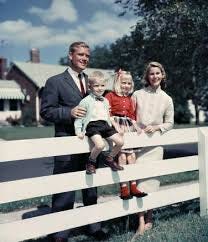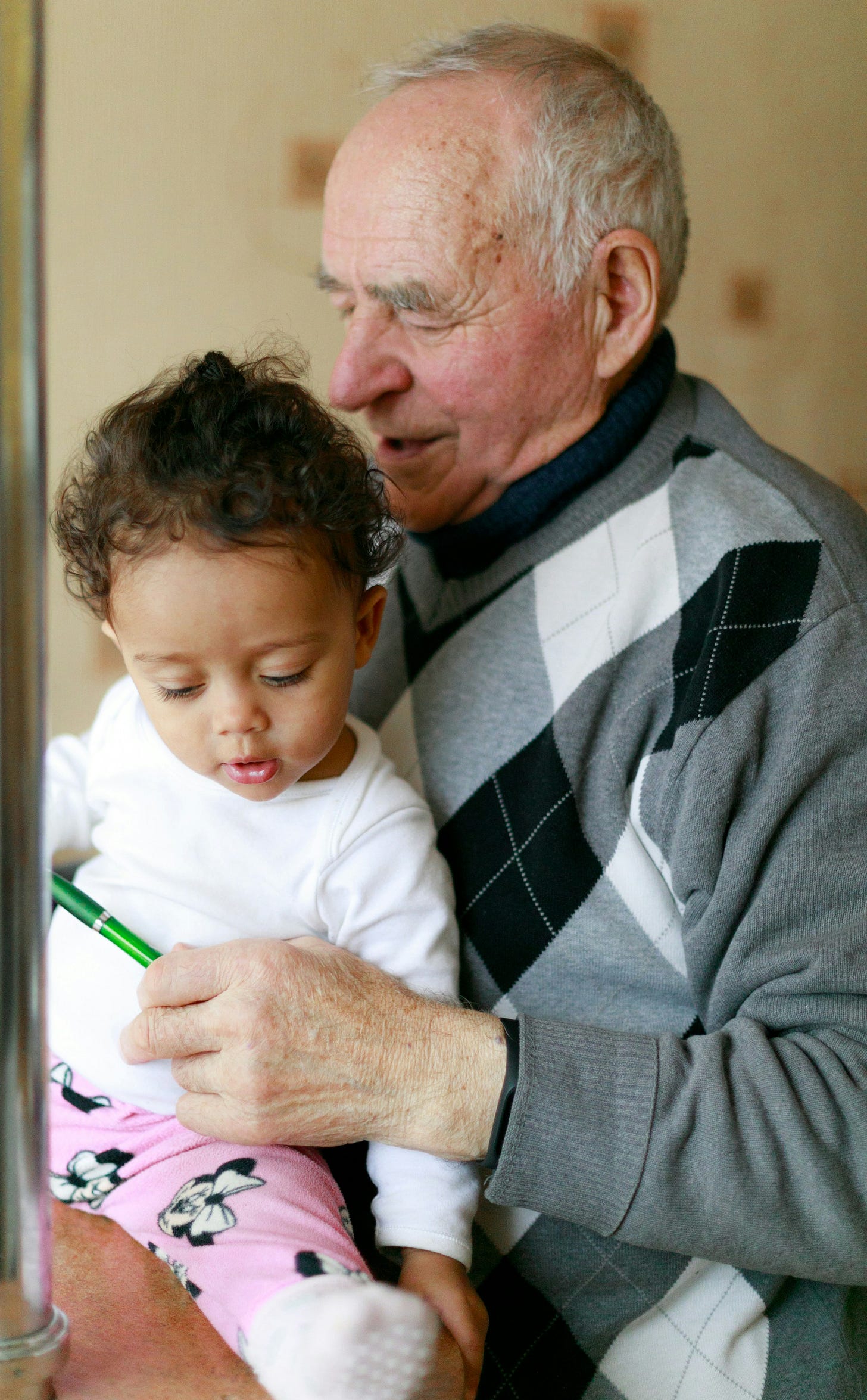Embracing Your Changing Family Dynamics
A snapshot freezes a single moment in time. Old family portraits where everyone is posed, smiling, and dressed in their “Sunday Best” may have a certain charm–but don’t capture the messy and always-evolving realities of family life.
Some of us long for an idealized family that we can see snapshotted through the backwards gaze of nostalgia’s rose-colored glasses. However, family is not a static image, but a living, changing network of connected lives. The second half of our lives often throws those shifts into sharp contrast as older relatives die, children leave the nest, and marriages, births, divorces, relocations, estrangements, and illnesses continually change the shape of our families. Judy Allen offers some insight below that she’s gleaned from her experience navigating the gifts and challenges of a changing family. We’d love to hear from you, too. What advice can you add to Judy’s to encourage someone who is struggling to adapt to a new normal in their family?
We also have a fresh harvest of media picks from our Sage Forum team, and a one question poll in this issue. We are grateful you’re a part of this community!
Journeying in faith with you,
Michelle Van Loon for the Sage Forum Team
Embracing Your Changing Family Dynamics
According to Pew Research Center, the percentage of married individuals living with children has dropped from 67% to 37% since 1970. There are other changes to family and extended family structures, such as getting married later or having children later or not at all.
Our family has grown in number from five to fifteen, and my parents’ family has sprouted from six to 32 members. Relationships and family dynamics have certainly changed.
sand·wich gen·er·a·tion
/ˈsanˌ(d)wiCH ˌjenəˈrāSHən/
[noun]
a generation of people, typically in their thirties or forties, responsible for bringing up their own children and for the care of their aging parents.
If that definition is accurate, I’m a double decker club sandwich. I have two weekly commitments with families of grandchildren, aged 5 months to 14 years-old, and I also visit my parents, who are in their 90s, once or twice a week. I handle phone calls from nurses and therapists, take them to multiple doctor’s appointments, and order supplies for them regularly.
My situation is not at all unusual, and I’m sure many who are reading this have more challenging circumstances. Parents in conflict with adult children, grandchildren, or their children’s spouses. Kids interactions with each other can get nasty. Some have lost contact with a loved one over differences that could not be resolved or for an unknown reason.
The dynamics of maintaining good relationships with members of a family, being true to God and yourself, being kind and gracious to others, while going through inevitable changes in family structure and new personalities is challenging.
My relationship with my parents has transitioned from daughter to care giver. Their minds are in good shape, it’s their bodies that are failing. I often feel like my visits are more checking off to-do lists than having good conversations.
It’s taken me a while to come to terms with this change in family dynamics, and I’ve learned a few things along the way.
Let Love Lead
When I am busy and don’t feel like I have time to go to one of my kids’ homes or visit my parents, I have learned – most of the time – to let love lead my agenda instead of letting my to-do list remain in charge.
It is difficult to know how much time to spend on care giving. My mom and dad would appreciate more frequent visits, but that would mean neglecting other responsibilities. So, I pray about it. I ask the Lord if a visit to them is in his agenda for me this day.
Communicate
Communication is a basic but often overlooked skill. Recently, we hosted a family birthday party that my parents would have attended if they had transportation, and as the hosts, it would have taken too much time to drive them. I told them that I would love to bring them, but it just wasn’t possible. My inclination was not to mention the event, but it was better for all of us that I communicated.
There are times when keeping your thoughts to yourself is a better idea, for family members may not react well to unsolicited advice. If you’re not sure, ask the Lord to let you know when you should share comments and when you shouldn’t.
Preserve the Relationship
My children are all leading their own lives. We get together with them regularly and have a great time, but there are issues over which we disagree. Minor issues, maybe, but trivial issues have a way of blowing up if we’re not careful, so we respect each other’s opinions. We have good relationships with them, and we want to keep it that way.
If you are in conflict with a family member, I recommend praying, praying some more, and waiting for the Lord to reveal a next step. He may not. You may have to trust God and let your end go. Remember, it’s more important stay in relationship than to be right.
If the conflict is severe or if it’s revealing unresolved issues in yourself, consider a good family counselor.
This season will pass
In the case of my care giving responsibilities, I realize that it is temporary. I’m extremely fortunate to have my parents still alive, and it helps to remember that on days when it’s difficult to manage their needs.
My grandchildren will eventually get to ages when they won’t need or want to hang out with their grandparents. That will be another change in family dynamics. I try to enjoy the season I’m inhabiting, because like everything in this world, it will change.
Plan for the future
Finally, I have begun to write down some of the lessons we have learned caring for my parents. It’s easy to acknowledge now, but I can’t imagine what it would feel like to have my kids clearing out our home as we have done twice for my parents. If that day arrives, I wonder if we’ll remember how it felt on the other end.
The changing family dynamics I’m experiencing are blessings. Our family has grown, we’ve loved and welcomed in-laws and grandchildren, and each one come with a unique personality and background.
It isn’t always easy, but we do our best to prayerfully let love lead, gracefully communicate honestly, and improve relationships while remembering that family dynamics are always changing.
What types of changes have you seen in your family?
ADDITIONAL RESOURCES ABOUT CHANGING FAMILY DYNAMICS
Views of the American Family in 2023 Are Mixed | Pew Research Center
How the American Family Has Changed | Pew Research Center
5 Steps to Healing if a Family Member Won't Change | Psychology Today
Family Estrangement Is On The Rise: A Psychologist Offers Ways to Cope
What resources would you add to this list?
October Media Picks From The Sage Team
Our recommendations this month range from a discussion-worthy read about technology to a film about the journey to America of a Contemporary Christian Music artist’s family.
[BOOK] The Anxious Generation by Jonathan Haidt was a frightening and well researched account of what smart phones have done to Gen Z. Fortunately, he gives some ideas for turning this around in the last couple chapters. (JA)
[VIDEO-Netflix] Monk. This series featuring a detective with serious mental health issues and a brilliant mind for cracking hard cases ran on basic cable from 2002-2009, and is now streaming on Netflix. Actor Tony Shaloub created an unforgettable character that made the show much more than a standard whodunit. (MV)
[BOOK] Meaning in the Moment: How Rituals Help Us Move through Joy, Pain and Everything In Between by Amy F. Davis Abdallah. This was a quick and interesting book that got me thinking about rituals for moments in life that are under-celebrated. (JA)
[BOOK] Breaking Free from Body Shame: Dare to Reclaim What God Has Named Good by Jess Connolly. An excellent study about a topic with which most girls and women struggle. The book offers practical techniques to change our mindset from worldly values to His Kingdom. (CD)
[PODCAST] Autocracy In America. This podcast, created by The Atlantic magazine, features a measured exploration of the rise in authoritarianism in the US from expert analysts Anne Applebaum and Peter Pomerantsev. It isn’t easy listening, but it is full of valuable food for thought and prayer. (MV)
[VIDEO-Amazon Prime] Unsung Hero is the true account of Rebecca St. James’s musical family, their move from Australia to the US, and the financial difficulties that they had in making the transition. It’s an engaging and uplifting story. (JA)
[BOOK] True North: A Novel by Andrew J. Graff is a novel about a family in upper Wisconsin running a rafting company for the summer. Sam and Swami met while training to be river guides, and perhaps they thought they could restore their relationships by going back to the beginning. Instead, they face unexpected competition, difficulties complicated by a mining company, marriage problems, and loss. Through this, they earned about themselves and each other. (JA)
What are you reading, listening to, or watching this month?
Assist us, Lord, in living hopefully into the future. In the face of change, help us to set unnecessary fears aside and to recognize our potential for creative response. Help us to develop a reasonable optimism when confronted by “the new” and to guard against our own defensiveness. Be with us as we remember and celebrate former times, and keep us from unreasonable yearning for them, which takes us from the work you have set before us in our time. All this we ask in the name of your Child, our Savior, Jesus Christ.
Amen.
(from St. Luke’s DC Prayers for Transition)
Photos by Humphrey Muleba, Joyce Busola, Simone Secci on Unsplash







As someone who has grown grands and a new great grand, I can tell you the transitions are unrelenting. I'm past the elder care giving stage and, as I was recently reminded, great grands don't have to babysit because no one trusts them with the baby. heh heh.
I will say I do have tender moments allowing myself to wander back to how it was when I was a young, energetic grandmother. Sometimes I grapple with what just can no longer be again. The dynamics of our family, a large tribe made up of blood relatives and those who were grafted in, means great changes for sure, especially since one generation is now middle and late middle aged. But we still have get togethers when we can and it's always memorable, full of laughing and leaving the crazy world outside for a bit and what we refer to as being 'epic'. I see this as a family heirloom that will be passed down the generations.
Change is the only constant in this life, for sure. We can go along and make the best of it or resist and miss out on the unexpected random, simple joys that come with the path God sets before us.
I started my substack as a way for me to share what it is like to be in the past the-sandwich-stage but not quite needing to be stored in a nursing home stage.
https://meemanator.substack.com/p/change
https://meemanator.substack.com/p/life-transitions
I remember that it was the fluctuating number of plates on the table that tipped me off. Change was coming—and it CAME! I am well aware that change is the new constant, and keep trusting for grace to be flexible and available.